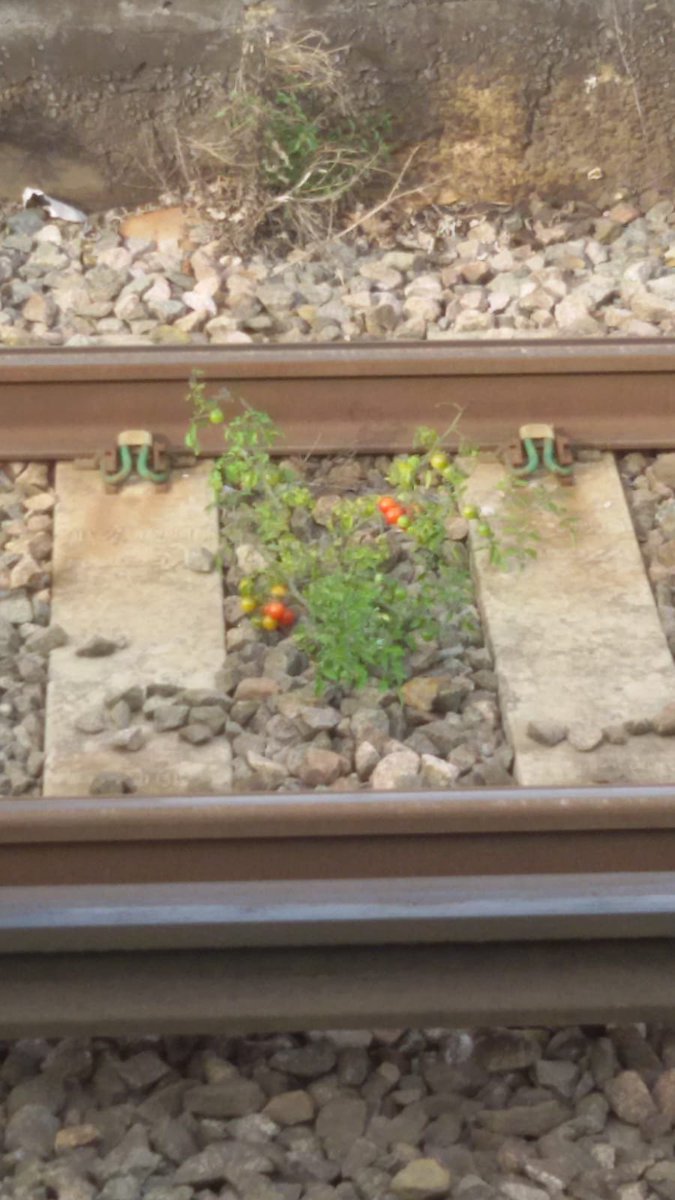This is a thread about what my friend found in her attic. #LGBThistory 

She had been meaning to show me for years, but with a little boy to raise and life getting in the way as it does, it wasn't until this year that we got around to it. It was worth the wait. She was moving home, and I came up to south London to help clear out the loft.
After a lot of rummaging and banging of heads on dusty rafters, finally we retrieved what we were looking for: two plastic carrier bags. As we sifted through the contents, I felt a rising thrill.
It became clear to me that we were looking at a small but significant archive of artefacts from a crucial period for the LGBTQI+ movement – an archive that must have been gathering dust, mysteriously forgotten, for decades.
One bag held issues of ‘Gay Comix’, gay publications (an edition of Pink Paper from June 1989 and an Irish gay magazine from 1985), pamphlets including from a campaign against the 1984 Police Bill, a gay theatre troupe bill & the 1st draft of a novel. Among other things. 



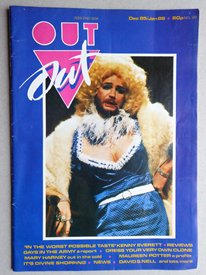
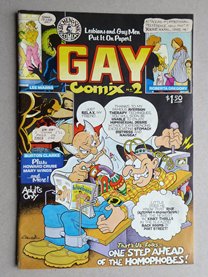

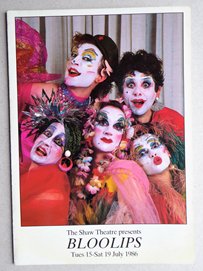
This was fascinating enough, but it was the contents of the second bag that really caught my imagination. I plunged my hand in and it jangled and click-clacked pleasingly. Jumbled together in it were more than 130 pin badges in 108 different designs and slogans. 
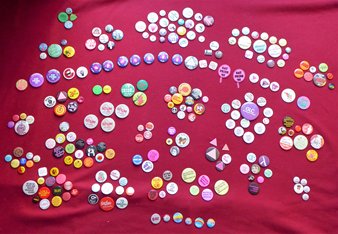
They ranged from early Gay Pride badges to feminist slogans to 'Save the Greater London Council' campaigning to Ireland to anti-fascism, atheism, anarchism and much more, including a lot of irreverent humour as well as some slogans and symbols that were a mystery to me. 




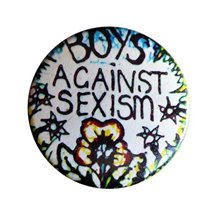
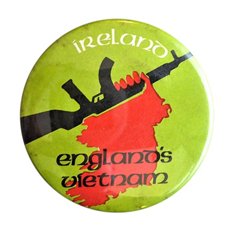
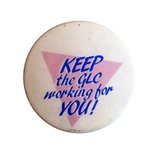
The range of interests and causes in the collection was broad but its owner clearly had radical left politics, and queer politics sometimes intersected with other interests like anti-fascism. 



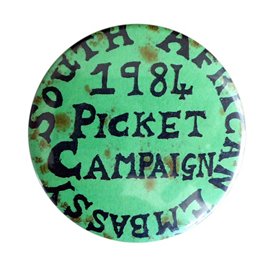

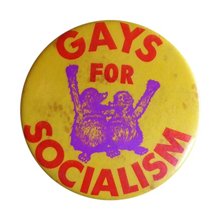
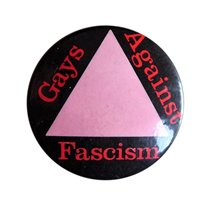
Immediately I felt their owner must have been someone with passion, wry humour, radical politics and intellect - but also that he or she might well have had some significant involvement in the struggles and campaigns represented by the badges. I HAD to find out who they were. 

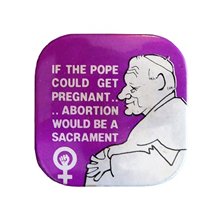
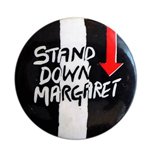
My friend entrusted the collection to me to find an appropriate home and use for it, and I spent days categorising the badges, photographing them and trying to figure out how to identify their former owner. 

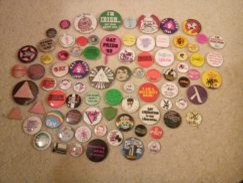
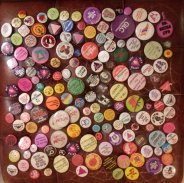
The novel manuscript, dated June 1989, seemed like it could be of personal significance, and so I began there. I searched online for the title of the novel and its author, and found that it had gone on to be published. 
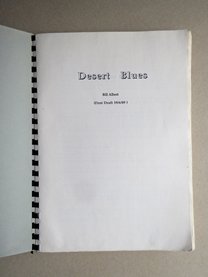
I emailed the writer, Bill Albert, explaining the situation and hoping he might know who would have had the first draft stowed in their south London attic.
Bill replied promptly: it would have been one of two people who had run a short-lived publishing company to which he had submitted his novel. One was now living in South Africa. The other, Paud Hegarty, had died 18 years ago from an Aids-related illness at the age of 45.
I felt immediately Paud Hegarty must be the name I’d been searching for – the archive included Ireland-related items, but also because the sad news that Paud had died confirmed a strong feeling I’d had that the collection’s owner was no longer with us. 

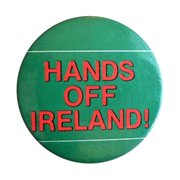
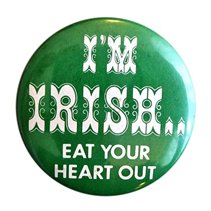
That the archive seemed carefully compiled and deliberately kept, yet was abandoned and overlooked for so long, seemed to suggest an unforeseen departure from the flat. Whether this was the result of an eviction, a break-up or a death, I hadn’t been sure until now.
I obviously embarked on a search to find out as much as I could about Paud Hegarty, and my excitement rose again when I realised that my other hunch had been correct, too: Paud was a significant figure from the LGBT+ rights struggle at a pivotal time and place. 
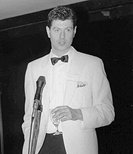
As manager of the famous @gaystheword bookshop in London in the 80s & 90s, Paud Hegarty had – with the shop’s directors and its other staff and managers – run a vital community resource. 



He had made the shop available as an organising space for campaigns including @LGSMpride (Lesbians & Gays Support the Miners, depicted in the movie Pride) and had courageously fought persecution by Customs & Excise in its homophobic attacks on free speech and our community. 





The more I found out, the more humbled I was to be in possession of Paud Hegarty’s belongings. He seemed to have been a brave, funny, whip-smart figure. 





Colin Clews, author of @gayinthe80s, has said of Paud: “He was a brave man and I hope his contribution to our community is fully recognised.”
I was charmed and inspired. As a gay man who came of age in the 90s, I was a child and teenager during the lonely chill of Section 28 and age of consent inequality – but I had narrowly missed a harder time in which courageous people took real and high-stakes risks for our rights.
Spending time with Paud‘s artefacts was a moving and thought-provoking experience for me, and felt like a huge privilege.
My next step was to contact Jim McSweeney, current manager, to let @gaystheword know about what had been discovered, and to seek their advice on finding a proper home for Paud Hegarty’s belongings.
When I took the collection to the Marchmont Street shop to show Jim and Uli – who runs the store with Jim – their delight was beautiful to see. Uli excitedly grabbed a camera and began snapping. Jim said of the items, “It feels like they’ve come home”. 
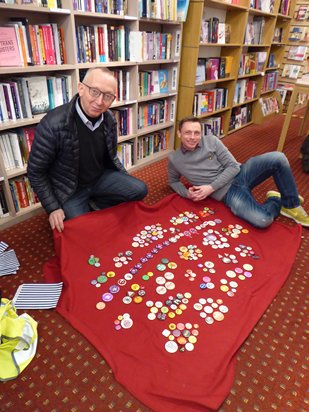
It wasn't a difficult decision: I donated the archive to Gay's the Word. The team there are working on how to display the badges on a rotating basis (far better than being shut in a museum archival drawer, rarely seen). Paud’s family have given their blessing, which is wonderful.
I felt that there was still more that could be done with these powerfully evocative objects. To browse, and to physically handle, the badges in particular, feels like a kind of time travel, and each badge seems pregnant with a hundred stories- 




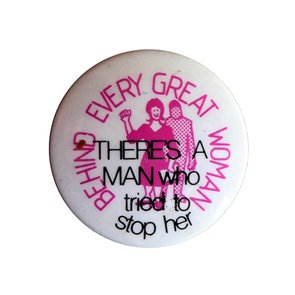

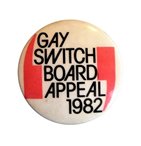
- stories of people, places, campaigns, events, and of the feelings that people must have had on wearing them in public, perhaps with proud defiance, perhaps with brave trepidation. 
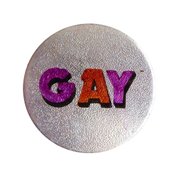
It also seemed to me that Paud’s collecting of these pins, pamphlets and press had been deliberate, perhaps as personal mementos but, I strongly suspect, also with a consciousness of their social, political & cultural importance in telling the story of a civil rights movement. 





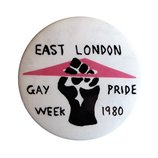

So that is why I’ve made a website - paudspins.wordpress.com - where you can browse all of the badges, and if they evoke memories and stories for you, you are warmly invited to comment there or send a message. 

If you were involved in any of the campaigns or events the badges reference, it would be great to hear from you. Or if you simply remember those times, or remember how it felt to wear those badges, please get in touch. 



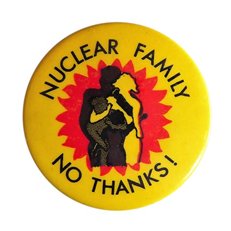
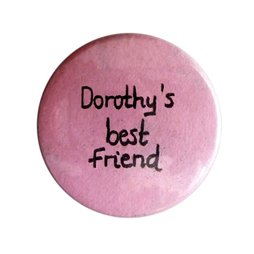


As the badges are such powerful objects to see and handle, with the support of Gay's The Word I'd also love to join you, if you'd like, to view the collection in person at the shop and have your memories documented. Do get in touch if you'd like to arrange that.
By doing so, you can help to give Paud Hegarty’s collection a valuable role in telling the history of our community, its politics and its struggle. I hope he would be pleased. 





I'm also so very chuffed to say that @Queerseum are hoping to come up with creative, illuminating events in which the badges can inspire people to tell their stories of queer history and queer struggle. That is going to be beautiful, I am sure. 

There’s a blog version of this tweet thread on the website, see Coming Out of the Attic, at: paudspins.wordpress.com/2018/06/30/com…
And if there’s a sizeable response to this project, I might use the @paudspins account for updates instead of this one, so do follow that account if this interests you.
If you know someone who is of a generation that might remember the times and places we're talking about but who is not on the Twitters, I'd love you dearly if you could steer them to the website. Thank you.
As I suspected, it's getting hard to keep track of responses. If there's something you would like me to *definitely* notice, please DM me! Or email paudspins@gmail.com. Comment at paudspins.wordpress.com. Also, do go over to @PaudsPins too. Thanks!
Here's some information on how best to share your stories (I might miss your valuable stories and memories if you only reply to a tweet, and that would be terrible!). paudspins.wordpress.com/tellyourstorie… 

• • •
Missing some Tweet in this thread? You can try to
force a refresh











